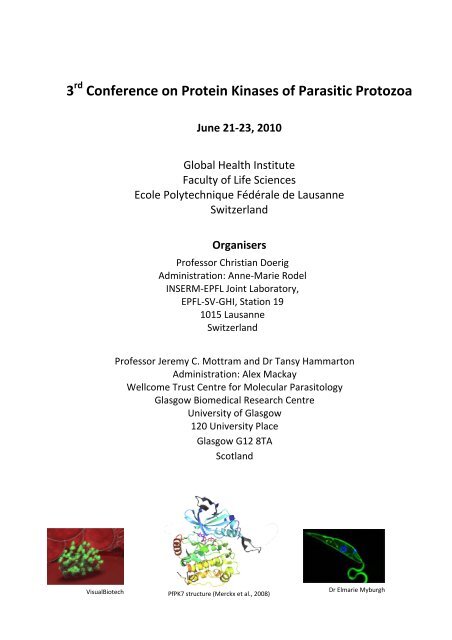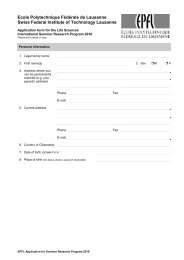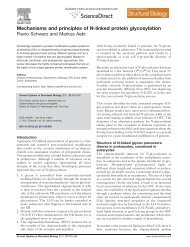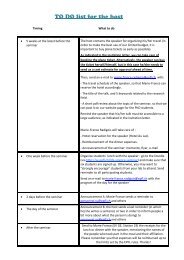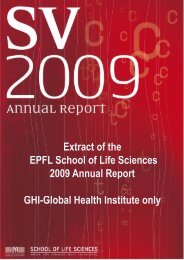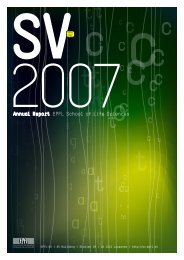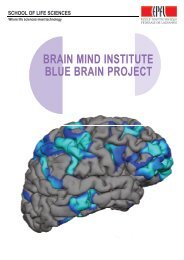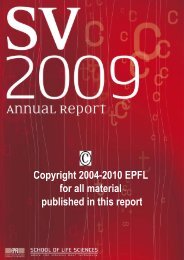3 Conference on Protein Kinases of Parasitic Protozoa - EPFL
3 Conference on Protein Kinases of Parasitic Protozoa - EPFL
3 Conference on Protein Kinases of Parasitic Protozoa - EPFL
Create successful ePaper yourself
Turn your PDF publications into a flip-book with our unique Google optimized e-Paper software.
3 rd <str<strong>on</strong>g>C<strong>on</strong>ference</str<strong>on</strong>g> <strong>on</strong> <strong>Protein</strong> <strong>Kinases</strong> <strong>of</strong> <strong>Parasitic</strong> <strong>Protozoa</strong>June 21‐23, 2010Global Health InstituteFaculty <strong>of</strong> Life SciencesEcole Polytechnique Fédérale de LausanneSwitzerlandOrganisersPr<strong>of</strong>essor Christian DoerigAdministrati<strong>on</strong>: Anne‐Marie RodelINSERM‐<strong>EPFL</strong> Joint Laboratory,<strong>EPFL</strong>‐SV‐GHI, Stati<strong>on</strong> 191015 LausanneSwitzerlandPr<strong>of</strong>essor Jeremy C. Mottram and Dr Tansy Hammart<strong>on</strong>Administrati<strong>on</strong>: Alex MackayWellcome Trust Centre for Molecular ParasitologyGlasgow Biomedical Research CentreUniversity <strong>of</strong> Glasgow120 University PlaceGlasgow G12 8TAScotlandVisualBiotechPfPK7 structure (Merckx et al., 2008)Dr Elmarie Myburgh
C<strong>on</strong>textDiseases caused by parasitic protozoa, such as malaria, sleeping sickness, leishmaniasis andtoxoplasmosis, have a huge mortality and morbidity impact, mostly in the developing world.Malaria al<strong>on</strong>e kills 1‐3 milli<strong>on</strong> people yearly. These diseases represent a very serious hindrance tosocio‐ec<strong>on</strong>omic development <strong>of</strong> affected countries. Several parasitic protozoa also affect livestockand c<strong>on</strong>tribute to the problem. The emergence and spread <strong>of</strong> resistance against currently availableantiparasitic drugs make the development <strong>of</strong> novel chemotherapeutic agents an urgent task.In view <strong>of</strong> (i) the success in targeting protein kinases (PKs) in other disease c<strong>on</strong>texts (notablycancer), and (ii) the divergence between the kinomes <strong>of</strong> the parasites and <strong>of</strong> their human hosts,PKs are c<strong>on</strong>sidered as attractive potential targets for novel antiparasitic agents.Two c<strong>on</strong>ferences, held in 2001 (Paris) and 2006 (Glasgow), were organised by Pr<strong>of</strong>. Christian Doerig(now at <strong>EPFL</strong>, Switzerland) and Pr<strong>of</strong>. Jeremy Mottram (Wellcome Trust Centre for MolecularParasitology, Glasgow), with the purpose <strong>of</strong> providing a forum <strong>on</strong> the topics <strong>of</strong> “PKs as targets forantiparasitc chemotherapy”. This led to a definite structuring <strong>of</strong> this nascent field, and to severalfruitful collaborati<strong>on</strong>s. In the four years that have elapsed since this particular research communitylast c<strong>on</strong>vened, several advances have been made, notably in structural biology <strong>of</strong> parasitic PKs, intarget validati<strong>on</strong> by reverse genetics, and in drug discovery approaches. A topic that particularlynecessitates an integrated approach is the exploitati<strong>on</strong> <strong>of</strong> the so‐called “malaria boxes”, which arecollecti<strong>on</strong>s <strong>of</strong> small molecules resulting from cellular screens <strong>on</strong> Plasmodium falciparum and whichpossess parasiticidal activity, but for which molecular targets remain unidentified. <strong>Protein</strong> kinasesrepresent a significant porti<strong>on</strong> <strong>of</strong> predicted targets, and it is urgent that the community organisesmolecular screens in a rati<strong>on</strong>al and efficient way.We therefore decided that it was timely to c<strong>on</strong>vene a third meeting <strong>on</strong> “<strong>Protein</strong> kinases <strong>of</strong> parasiticprotozoa”.Key topics at the c<strong>on</strong>ference will include :• Functi<strong>on</strong> <strong>of</strong> protein kinases in the life cycle <strong>of</strong> protozoan parasites.• Target validati<strong>on</strong>; dissecting the comp<strong>on</strong>ents <strong>of</strong> protein kinase signaling pathways;regulati<strong>on</strong> <strong>of</strong> protein kinases.• Structural biology <strong>of</strong> protozoan protein kinases; chemistry <strong>of</strong> protein kinases inhibitors• <strong>Protozoa</strong>n protein kinases as drug targets; Target based screens/cell based screens; proteinkinase focused libraries
Venue and datesThe meeting will take place at the GHI‐<strong>EPFL</strong> (Global Health Institute, Ecole Polytechnique Fédéralede Lausanne), Room SV1717A, Switzerland, 20‐23 rd June 2010.Number <strong>of</strong> participantsApproximately 60 scientists from Europe, North America, Australia and India will be present.Organisers <strong>of</strong> the c<strong>on</strong>ferencePr<strong>of</strong> Christian Doerig, Global Health Institute, <strong>EPFL</strong>, LausannePr<strong>of</strong> Jeremy Mottram, Wellcome Trust Centre For Molecular Parasitology, University <strong>of</strong> GlasgowDr Tansy Hammart<strong>on</strong>, Wellcome Trust Centre For Molecular Parasitology, University <strong>of</strong> GlasgowAdministrative c<strong>on</strong>tacts for the c<strong>on</strong>ference :Anne‐Marie Rodel, Global Health Institute, <strong>EPFL</strong>, LausanneAlex Mackay, Wellcome Trust Centre For Molecular Parasitology, University <strong>of</strong> GlasgowSp<strong>on</strong>sors <strong>of</strong> the meeting are Intervet Innovati<strong>on</strong>s GmbH , <strong>EPFL</strong>, Inserm, Debiopharm, BanquePictet, the WellcomeTrust Centre for Molecular Parasitology and Applied Biosystems. The organizersgratefully acknowledge their support.


